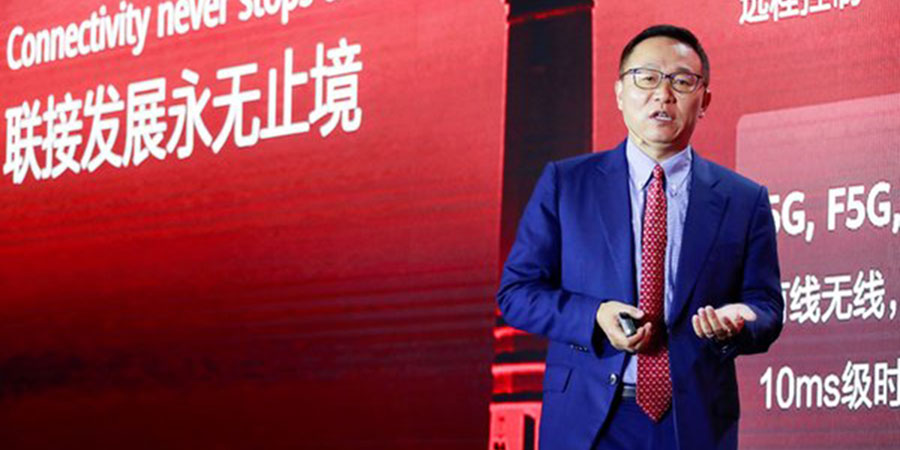The UN Broadband Commission and Huawei held the sixth Ultra-Broadband Forum (UBBF 2020) online in Beijing. With the theme of "Intelligent Connectivity, New Value Together", this year's UBBF discussed the challenges and opportunities facing the connectivity industry in the intelligent era.
At the event, David Wang, Huawei Executive Director and Chairman of the Investment Review Board, delivered a keynote speech titled "Building intelligent connectivity for an intelligent world". Mr. Wang also launched Huawei's all-scenario intelligent connectivity solutions for home and enterprise scenarios. Through these scenarios, home broadband will enter the experience economy era and the digital transformation of industries will be accelerated.
The connectivity industry is seeing five exciting changes
Every upgrade of connectivity has fundamentally changed society. Now, as we move towards the intelligent era, individuals, homes, and enterprises are placing higher requirements on connectivity than ever before, and new technologies, such as cloud and AI, are quickly integrating with connectivity. This is leading the connectivity industry to experience five exciting changes:
The first change is from IoT and intelligent IoT to connected Intelligent Twins. In the past, we aimed to connect all people and homes. This was Internet of everything. As we pursue a seamless AI life and the intelligent upgrades of enterprises, we must connect more things with intelligence. This is intelligent Internet of everything. According to third-party forecasts, the number of connections worldwide will reach one trillion by 2035, making ubiquitous connectivity and pervasive intelligent a reality.
The second change is from office to office + production. COVID-19 has transformed people's needs for home broadband. In enterprise scenarios, connectivity has gone beyond serving offices to serving both offices and production. The focus of enterprise digitization has shifted from digital office to digital production, transactions, and operations.
Thirdly, from best effort to differentiated deterministic services. Industries vary in terms of service scenarios and connectivity requirements. If differentiated services are the default, then deterministic experience is a must. Therefore, operators can only open the door to vertical markets by providing differentiated and deterministic services.
Next, from Mbps to Gbps via any medium. Multiple access technologies exist, including cellular, Wi-Fi, and optical fiber technologies, and the diversity of service scenarios mean that multiple access technologies will co-exist for many years to come. Through concerted efforts across the industry, 4G, 5G, Wi-Fi, and fiber technologies can now deliver ubiquitous gigabit connectivity.
Lastly, from manual O&M to hyper-automation. 5G will make network O&M more complex than that of 4G. Manual O&M will be inadequate to handle these new complexities, and give way to hyper-automation powered by big data and AI to simplify O&M decision-making.
Moving towards intelligent connectivity with AI
These five changes are placing new requirements on connectivity. To meet these requirements and realize greater productivity, connectivity must be upgraded to the next level.
The first requirement is ubiquitous gigabit, as bandwidth is the foundation of connectivity. Ubiquitous gigabit connectivity is necessary for ultra-HD video, industrial VR/AR applications, AI cameras, and drones.
The second requirement is deterministic experience, which is essential to home scenarios such as telecommuting and online learning, as well as enterprise scenarios like safe and reliable production.
The third requirement is hyper-automation. As networks advance in terms of complexity and scale, big data and AI must be utilized to achieve hyper-automation.
In the intelligent era, intelligent connectivity will take on three major characteristics: Ubiquitous gigabit, deterministic experience, and hyper-automation.
Huawei's all-scenario intelligent connectivity solutions
During the event, Mr. Wang launched Huawei's all-scenario intelligent connectivity solutions, including intelligent distributed access solutions for homes, as well as intelligent campus networks, intelligent premium private lines, and intelligent cloud network solutions for enterprises.
a) Intelligent distributed access: This solution has comprehensively upgraded home devices, the local end, and network management. With gigabit Wi-Fi coverage throughout entire rooms, high-quality service experience, and precise user identification, intelligent distributed access will allow operators to benefit more from network experience than from the user base.
b) Intelligent campus networks: Thanks to central LAN & WAN management, Gbps access, and AI-based intelligent O&M, intelligent campus networks allow operators to provide one-stop network solutions for enterprises as they move to the cloud.
c) Intelligent premium private lines: This solution greatly reduces latency thanks to all-optical switching technology, enabling operators to offer high-end enterprise users 1ms ultra-low latency and the ultimate experience. Built upon Liquid OTN technology, flexible hard pipes support flexible bandwidth access ranging from 2 Mbps to 100 Gbps, and lossless service adjustment. In addition, intelligent premium private lines connect enterprise customers to wavelength-level private networks through exclusive wavelength or subwavelength resources.
d) Intelligent cloud networks: This solution aims to create synergy between the cloud and network in the cloud era. Based on intelligent IP networks, intelligent cloud networks will build a high-quality cloud private network, allowing enterprises to access multiple clouds.
"Over the past 30 years, Huawei has worked with customers and partners to create a seamless AI life for all homes and drive the intelligent upgrades of all industries. Our ultimate goal is to grow the digital economy and improve people's lives," said Mr. Wang.
"Through continuous investment in 5G, Optical Network and IPv6 Enhanced innovation, today we launch our all-scenario intelligent connectivity solutions. These solutions will make ultra-broadband networks greener and more efficient and create a more intelligent world. Moving forward, we will redouble our efforts in basic research, invest more in next-generation network technologies, and work with all stakeholders to shape a more low-carbon, efficient, and intelligent world."





